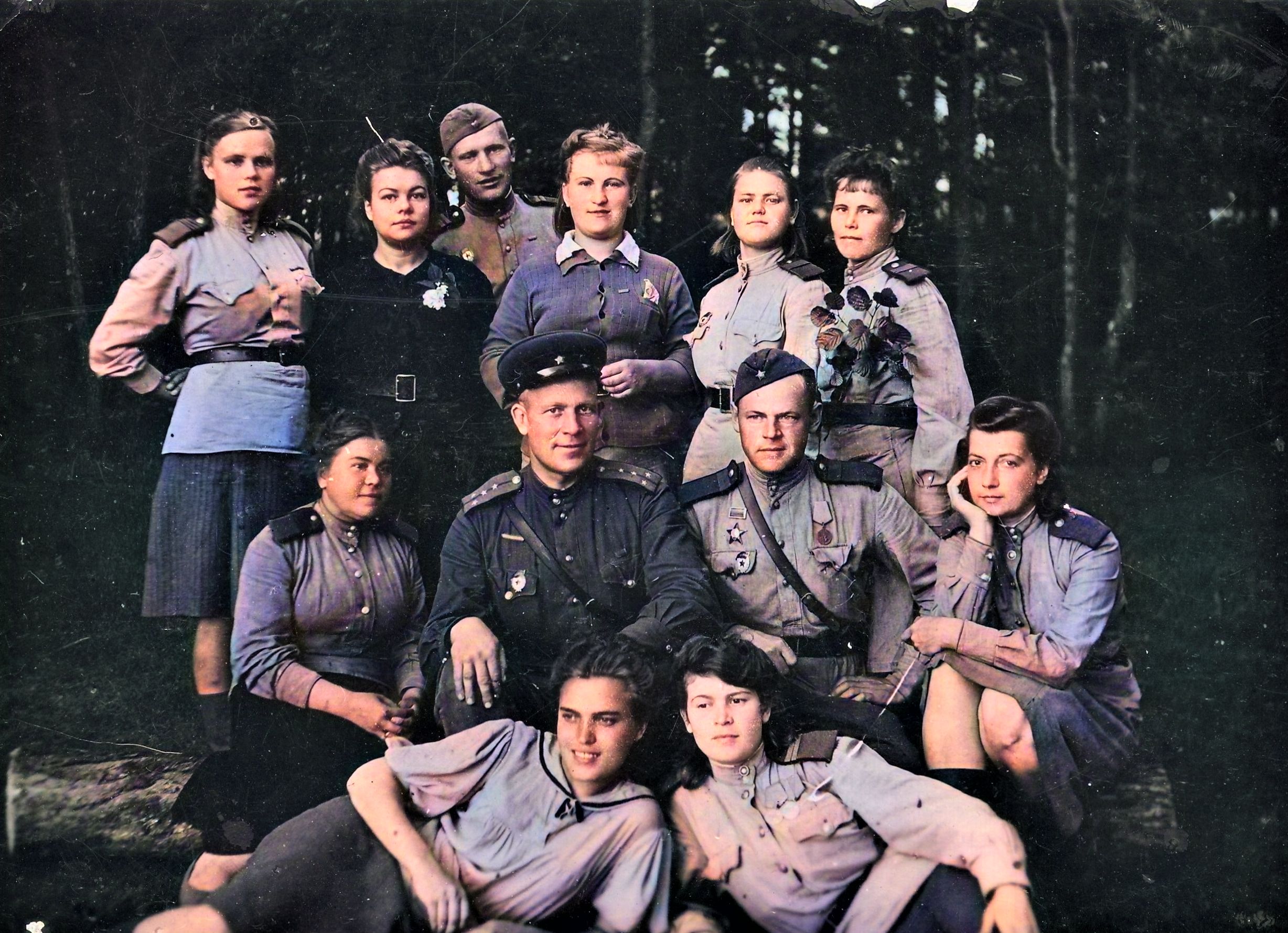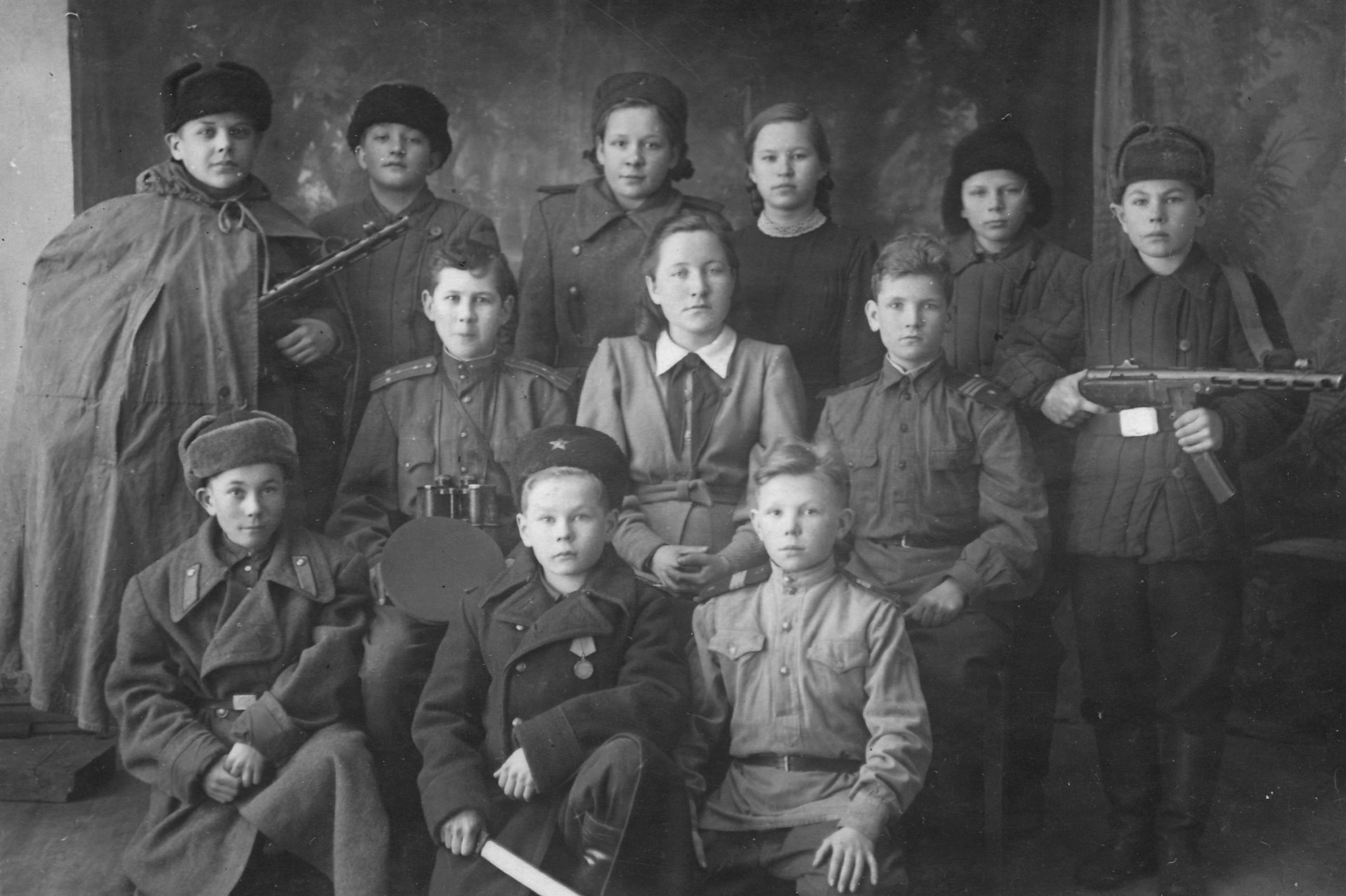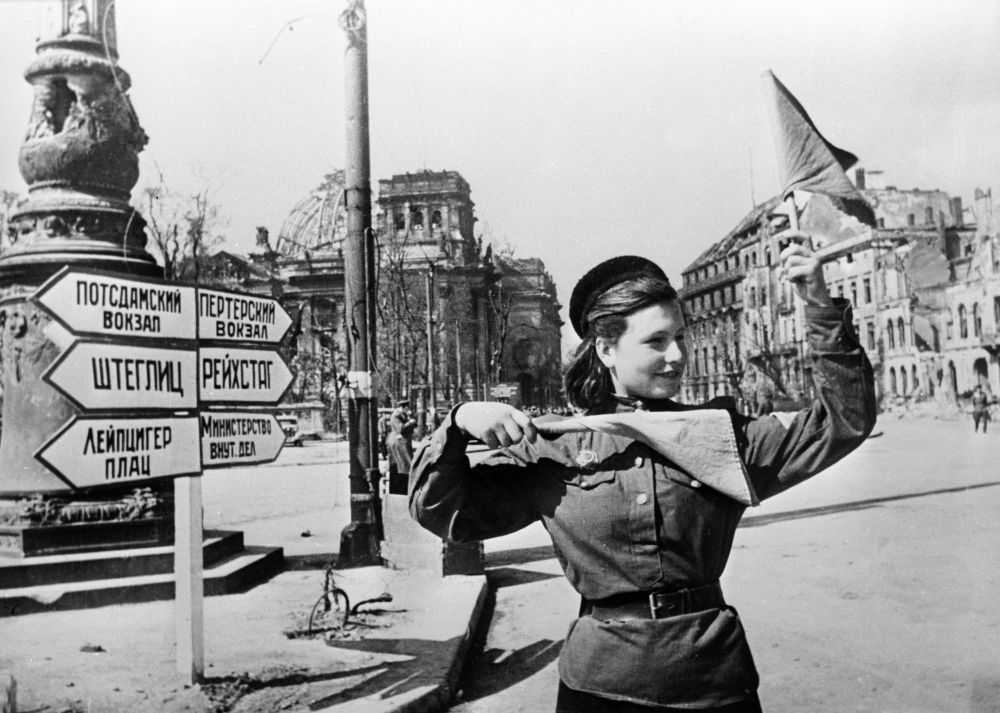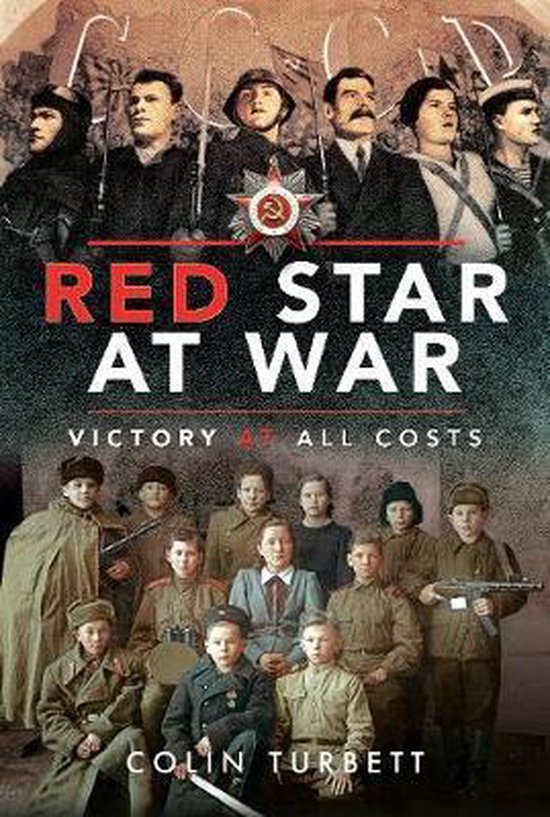WWII was above all won by the blood and sacrifice of the Soviet people
Russia’s losses during the Second World War were beyond imagination and touched the lives of an entire population caught between a brutal and murderous invader and a ruthless leadership at home. Soviet victory over the Nazis, which effectively won the war, according to the author, was the end result of effort and sacrifice by the ordinary millions who were totally committed to saving their motherland'. The humanity of the ordinary Soviet citizen in uniform is often forgotten because of later Cold War narratives propagated East and West for differing ideological reasons. With Red Star at War Colin Turbett seeks to redress these imbalances. We asked him some questions about his book by e-mail.
 Unknown Red Army Soldiers. Spring 1945.
Unknown Red Army Soldiers. Spring 1945.
Your book is published in the United Kingdom. Do you have ambitions to release it in other countries, for example in Russia or other countries of the former Soviet Union?
The book was published in the UK and USA a year ago. I believe the book is available worldwide but there would be no justification just now for it to be translated into other languages. I am not sure how it might be received in Russia – I guess there is a natural cynicism about foreign authors writing histories of a country they might be accused of knowing little about. The book was written primarily for a home audience in an effort to correct misconceptions about the Soviet Union’s role in World War 2. We have several generations now of people who, if they take any interest at all in our recent history, believe that the war was won by the Americans with some help from the British. In reality it was British tenacity in the early stages, American dollars from 1941, and above all the blood and sacrifice of the Soviet people. My mission was to demonstrate that this involved ordinary people who are just like us – only braver and with a greater love of their homeland!
You have a special interest in this (consciously?) forgotten and relatively unknown part of the Second World War. Where does your fascination come from?
I grew up surrounded by very live memories of the War – both my parents were involved in the conflict as were the parents of everyone I knew. Movies, comics and books all provided visions of the war, and as I got older and read more, I realised that they were based on a particular version of events that reflected the Cold War. The truth was a different matter altogether. We were brought up to see the USSR and its people as enemies. As a socialist by inclination I have always thought that what the USSR tried to achieve was misrepresented – despite its obvious aberrations and absence of freedoms.
 Red Army Graves Gdansk, Poland, 2015
Red Army Graves Gdansk, Poland, 2015
Writing this book, based on many reports and personal stories, will have taken a long time. How long did it take to complete this book from the idea to the publication of this first edition?
About six months of research and writing. I managed to get some original material together – especially many of the personal photographs, but many of the stories are out there but hard to find in the English language. Publication with Pen & Sword takes a year from the date you complete the first draft of the completed book. The publisher is always very helpful in all this.
Is there an event or person described in this book with a special significance to you?
I find the personal stories all very sad and I have nothing but admiration for all those involved. I think the story of the mother and son who both fought on the same front is poignant, as is the well known story of Roza Shanina. The story that really made me cry when I read Valentina’s translations was the series of letters from the front of the artillery officer Lev Lebedev, who was killed in September 1943.
 Children at War – details unknown.
Children at War – details unknown.
In the acknowledgments you describe the great and indispensable role of translator Valentina Kudinova and of some others. How did they help you and will you work with this people again when writing a new book?
Yes I have worked with Valentina now on three books with another one in process. Valentina has access to sources that I would find difficult. She also communicated with others in Russia and Ukraine for me which was helpful. I am learning Russian but have a long way to go!
Your book has been rated by our reviewer with the maximum score of 5 stars. How did you manage to keep the overview with so much information available?
Thanks very much! I have been writing for some time – not professionally but in relation to my previous work, and I find it enjoyable and rewarding. I usually find that ideas come to me when I start thinking about a subject and I then follow them up with research and reading – it all comes together from there.
The relation between the West and the former Soviet Union or Russia today has always been under pressure after World War Two. Did you get help from people in the former Soviet Union? If so, how did they react about your book when you asked them for help? Did you experience helpfulness or mistrust?
I got great assistance from everyone I contacted in the Russian Federation but the embargo by Britain, which included bank transfers, made it difficult if any money transaction was needed. I got good feedback from those I sent the book to.
 Lydia Spivak at Brandenburg Gate. Berlin, May1945.
Lydia Spivak at Brandenburg Gate. Berlin, May1945.
What were your most important sources? Is there a particular event or an incident that made a big impression on you while gathering information and writing this book?
Ebay is a great resource for original Soviet material – although I think collectors in the West have made purchases quite expensive. It saddens me though that there is such willingness to sell memories of those times – it reflects difficulties in the Russian economy and how desperate some people are.
Why should people read your book and what do you hope they learn from it?
I hope that Red Star at War gives some insight into the lives of ordinary people in the USSR during wartime and the years leading up to the war. Difficult years for everyone but humanity shines through! The photographs make it a worthwhile purchase although their quality is not great which is to do with ageing and poor quality equipment. I hope people enjoy the book and if they do will look at my others: The Anglo-Soviet Alliance published earlier this year and Soviets in Space which is published at the end of November 2021. Both cover stories that have been distorted in western narratives – the alliance with Britain in the War, and the early years of the Space when the Soviets were in the lead.
 Unknown Red Army Soldiers. Spring 1945.
Unknown Red Army Soldiers. Spring 1945.Your book is published in the United Kingdom. Do you have ambitions to release it in other countries, for example in Russia or other countries of the former Soviet Union?
The book was published in the UK and USA a year ago. I believe the book is available worldwide but there would be no justification just now for it to be translated into other languages. I am not sure how it might be received in Russia – I guess there is a natural cynicism about foreign authors writing histories of a country they might be accused of knowing little about. The book was written primarily for a home audience in an effort to correct misconceptions about the Soviet Union’s role in World War 2. We have several generations now of people who, if they take any interest at all in our recent history, believe that the war was won by the Americans with some help from the British. In reality it was British tenacity in the early stages, American dollars from 1941, and above all the blood and sacrifice of the Soviet people. My mission was to demonstrate that this involved ordinary people who are just like us – only braver and with a greater love of their homeland!
You have a special interest in this (consciously?) forgotten and relatively unknown part of the Second World War. Where does your fascination come from?
I grew up surrounded by very live memories of the War – both my parents were involved in the conflict as were the parents of everyone I knew. Movies, comics and books all provided visions of the war, and as I got older and read more, I realised that they were based on a particular version of events that reflected the Cold War. The truth was a different matter altogether. We were brought up to see the USSR and its people as enemies. As a socialist by inclination I have always thought that what the USSR tried to achieve was misrepresented – despite its obvious aberrations and absence of freedoms.
 Red Army Graves Gdansk, Poland, 2015
Red Army Graves Gdansk, Poland, 2015Writing this book, based on many reports and personal stories, will have taken a long time. How long did it take to complete this book from the idea to the publication of this first edition?
About six months of research and writing. I managed to get some original material together – especially many of the personal photographs, but many of the stories are out there but hard to find in the English language. Publication with Pen & Sword takes a year from the date you complete the first draft of the completed book. The publisher is always very helpful in all this.
Is there an event or person described in this book with a special significance to you?
I find the personal stories all very sad and I have nothing but admiration for all those involved. I think the story of the mother and son who both fought on the same front is poignant, as is the well known story of Roza Shanina. The story that really made me cry when I read Valentina’s translations was the series of letters from the front of the artillery officer Lev Lebedev, who was killed in September 1943.
 Children at War – details unknown.
Children at War – details unknown.In the acknowledgments you describe the great and indispensable role of translator Valentina Kudinova and of some others. How did they help you and will you work with this people again when writing a new book?
Yes I have worked with Valentina now on three books with another one in process. Valentina has access to sources that I would find difficult. She also communicated with others in Russia and Ukraine for me which was helpful. I am learning Russian but have a long way to go!
Your book has been rated by our reviewer with the maximum score of 5 stars. How did you manage to keep the overview with so much information available?
Thanks very much! I have been writing for some time – not professionally but in relation to my previous work, and I find it enjoyable and rewarding. I usually find that ideas come to me when I start thinking about a subject and I then follow them up with research and reading – it all comes together from there.
The relation between the West and the former Soviet Union or Russia today has always been under pressure after World War Two. Did you get help from people in the former Soviet Union? If so, how did they react about your book when you asked them for help? Did you experience helpfulness or mistrust?
I got great assistance from everyone I contacted in the Russian Federation but the embargo by Britain, which included bank transfers, made it difficult if any money transaction was needed. I got good feedback from those I sent the book to.
 Lydia Spivak at Brandenburg Gate. Berlin, May1945.
Lydia Spivak at Brandenburg Gate. Berlin, May1945.What were your most important sources? Is there a particular event or an incident that made a big impression on you while gathering information and writing this book?
Ebay is a great resource for original Soviet material – although I think collectors in the West have made purchases quite expensive. It saddens me though that there is such willingness to sell memories of those times – it reflects difficulties in the Russian economy and how desperate some people are.
Why should people read your book and what do you hope they learn from it?
I hope that Red Star at War gives some insight into the lives of ordinary people in the USSR during wartime and the years leading up to the war. Difficult years for everyone but humanity shines through! The photographs make it a worthwhile purchase although their quality is not great which is to do with ageing and poor quality equipment. I hope people enjoy the book and if they do will look at my others: The Anglo-Soviet Alliance published earlier this year and Soviets in Space which is published at the end of November 2021. Both cover stories that have been distorted in western narratives – the alliance with Britain in the War, and the early years of the Space when the Soviets were in the lead.
- Red Star of War
- Victory at all costs
- ISBN: 9781526763280
- More information about this book


Used source(s)
- Source: Colin Turbett / TracesOfWar
- Published on: 10-10-2021 15:10:29
Related news
- 11-'24: Postal artifacts provide a vibrant testament to the experiences of the Dutch people during WWII
- 10-'24: DigitalBattlefieldTours unlocks military tactics to a wide audience
- 08-'24: Researching his father’s WWII history became a passion for Steve Snyder
- 08-'24: Who was the owner of the photo album from Dachau?
- 07-'24: The British people welcomed African American servicemen with open arms
Latest news
- 16-02: Armin T. Wegner and his letter to Hitler
- 14-02: The hugely popular ‘Standing with Giants’ installation returns to the British Normandy Memorial
- 27-01: Russia focuses on Soviet victims of WW2 as officials not invited to Auschwitz ceremony
- 27-01: Oswald Kaduk, ‘Papa Kaduk’ or a monster?
- 12-'24: Christmas and New Year message from our volunteers
- 11-'24: New book: Righteous Behind Barbed Wire
- 11-'24: Postal artifacts provide a vibrant testament to the experiences of the Dutch people during WWII
- 10-'24: DigitalBattlefieldTours unlocks military tactics to a wide audience
- 10-'24: Lily Ebert, Holocaust Survivor, Author and TikTok Star, Dies at 100
- 10-'24: Commemoration 7th Battalion the Hampshire regiment

